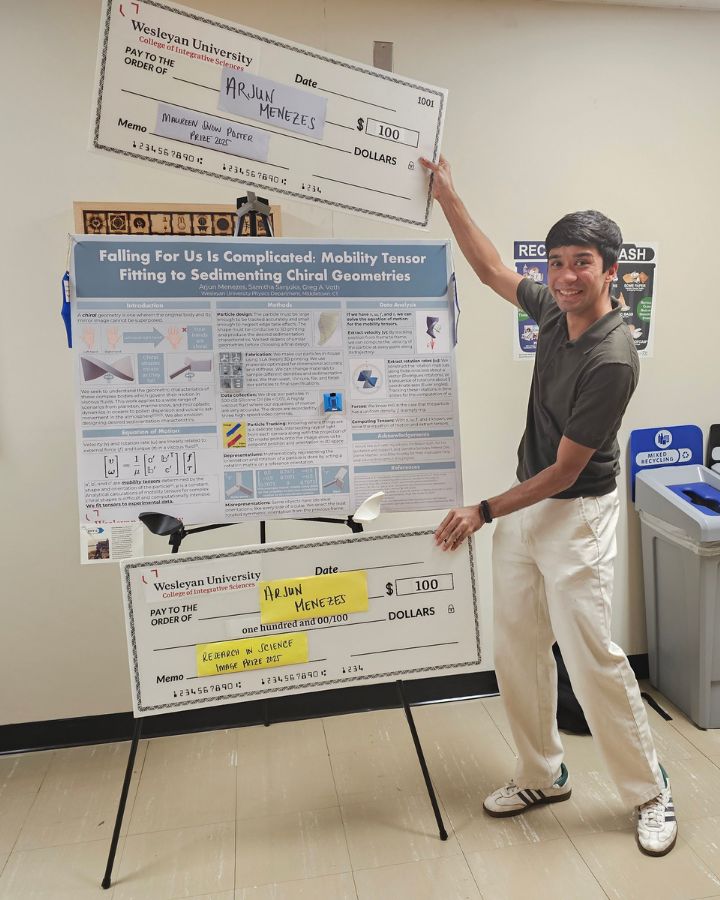News and Notes from the College of Integrative Sciences
New on the blog!
- Dr. Katie Boyce-Jacino ‘10 is Building Cases of Diverse Stories
- WesWAVES Expands On Inclusion in STEM
- Lighting the Way: Professor Michelle Chen on Renewable Energy and Representation in Science
- Professor Oriana Fisher Finds Beauty in Discovery and Diversity
- Sonia Roberts’ Interdisciplinary Take on the Future of Robotics
- Professor Christine Caruso on Food Justice and Being in Community
- Ishita Mukerji’s Impact on Wesleyan
- Professor Erika Taylor is Committed to Creating Community for All
- Environmental Impacts on Sex Determination in Reptiles: The New Tezak lab in the Wesleyan Biology Department
- WesSIR's Lab Shadowing Week: Breaking Barriers in Research
- Professor Grace McKenzie-Smith on Social Perturbations in Insects and in Physics
Newsletter!
CIS is Highlighted in The Wesleyan Connection
- The College of Integrative Sciences’ course-based undergraduate research experience (CURE) offers students the ability to do in-class research investigating real-world questions.
Congratulations!
Kelly Thayer has been appointed as the first assistant professor in the College of Integrative Sciences. Thayer is a prolific researcher in the field of computational molecular biophysics, blending physical chemistry, structural biophysics, and machine learning to investigate challenges in pharmaceuticals. She has introduced new computational strategies for studying proteins in her research. [Wesleyan Welcomes New and Visiting Faculty Members]

Congratulations to our double first place prize winner! Arjun Menezes won first place in both the Scientific Imaging prize and Maureen Snow poster prize anounced at this past summer's Summer Science Symposium. All other prize winners are listed here.
2025 Academic Year Prizes
CIS major Anand Parikh is awarded the Scott Biomedical Prize.
CIS major Macy Thompson is awarded the Peirce Prize.
CIS major Aiden Trendell is awarded the Mary and John Sease Prize.
CIS major Anand Parikh is awarded HIGH HONORs in CIS for his thesis "Introducing ORACLE: Accelerating the Search for Therapeutics".
CIS major Josh Phythian is awarded HIGH HONORs in CIS for his thesis "Sector Analysis of the p53 Tumor Suppressor Protein".
CIS major Anand Parikh elected to Wesleyan University’s Gamma Chapter of Phi Beta Kappa, Spring 2025

- Congratulations to CIS Major Macy Thompson elected to Phi Beta Kappa
- Summer Science Symposium Prize Winners
Summer Science Symposium Prize Winners
Eight students were awarded prizes during the 2024 Research in Sciences summer program. The winners and ten honorable mentions are all listed here.
- CIS Majors Prizes Spring 2024

Senior major Jocelyn Wang received High Honors for her thesis Origins of Ecological Diversity in Bacillus: A Computational Approach to Genomic Analysis of Ecotypes.
- Nakial Cross '25 awarded the Dr. Neil Clendeninn Prize
- Adin Dowling '25 awarded the Barry M. Goldwater Scholarship
- Adin Dowling '25 awarded the Karl Van Dyke prize
- Jamar Kittling '24 awarded the Littell Prize
- Jessica Luu '24 awarded the Bradley Prize
- Jessica Luu '24 awarded the Wallace C. Pringle Prize for Research in Chemistry
- Ava Purdue MA '24 awarded the Wesleyan Animal Studies Prize
- Joecelyn Wang '24 awarded the Michael Rice Prize in Computer Science
- Mingyu Wang '24 awarded the Scott Biomedical Prize
- Adin Dowling '25 named a 2024 Goldwater Scholar
Adin Dowling '25 named a 2024 Goldwater Scholar
Read more about the Barry Goldwater Scholarship and Excellence in Education Foundation at this link.
- Congratulations to CIS Majors elected to Phi Beta Kappa

Congratulations to CIS Majors Jamar Kittling and Jocelyn Wang, elected to Wesleyan University’s Gamma Chapter of Phi Beta Kappa, Spring 2024.
- New Research Suggests Ocean May Increase in Oxygen During Warming

The climate change Earth is experiencing today is similar to that during a period of rapid and intense global warming it experienced some 56 million years ago. Understanding the similarities can help scientists evaluate what is happening in today’s warming world, according to Ellen Thomas, Harold T. Stearns Professor of Integrative Sciences, Emerita.
Key to that understanding is figuring out how much oxygen was dissolved in large swaths of the oceans during that period of rapid warming, called the Paleocene-Eocene Thermal Maximum or PETM, when average temperatures increased by 5-8o Celsius or 9-14o Fahrenheit in a few thousand years, compared to now, Thomas said.
“Most ocean life forms, including fish, need oxygen, so the loss of oxygen would mean loss of an important food source for many people, especially in tropics and subtropics,” she said.
- 'Meet Our Researchers' highlights research on campus

'Meet Our Researchers' highlights research on campus
A new exhibit in Olin Library celebrates how researchers from all parts of our community—undergrads to emeriti—understand and build upon the entirety of what we know about ourselves, each other, and the environment in which we live. From chemistry to karaoke and paleontology to politics, the eight researchers profiled exemplify Wesleyan’s diverse interests and impacts across disciplines. One of the featured researchers is our own Harold T. Stearns Professor of Integrative Sciences, Emerita, Ellen Thomas.
Meet Our Researchers is located in Olin’s West Corridor and will be on display through this academic year. You can read more about the featured researchers online.
If you would like to be profiled in 2024-25, please contact Jill Livingston:jlivingsto01@wesleyan.edu.
- CIS Major Julissa Cruz Bautista '25 to represent Wesleyan at C.O.L.O.R. Conference
CIS Major Julissa Cruz Bautista '25 to represent Wesleyan at C.O.L.O.R. Conference
Julissa Cruz Bautista '25, MB&B and CIS major and SACNAS secretary of the board, recieved a full award to attend the SACNAS National conference this fall and to represent Wesleyan's chapter during the 2023 C.O.L.O.R retreat.
C.O.L.O.R. is a 1 day retreat designed to support SACNAS chapter officers as they continue to place themselves in positions of leadership within their chapters, campuses, and communities. This retreat will not only equip chapter leaders, but also highlight and strengthen their leadership talents through connection and unity with the broader chapter network.
Julissa was profiled for the Inclusion in STEM blog last year.
- 2023 Summer Program Prize Winners
Eight students were awarded prizes during the 2023 Research in Sciences summer program. The winners and nineteen honorable mentions are all listed here.
- Senior major Aidan Jones receives High Honors
Congratulations to Aidan Jones '23

Senior major Aidan Jones receives High Honors for his thesis The Impact of Familial ALS-Associated Mutations on Astrocyte Activation under Serum and Serum-Free Conditions.
Mentor: Alison O'Neil
Aidan exemplifies the ideal of the College of Integrative Sciences. He is majoring in MB&B, works in a Chemistry Department lab, and recently gave a senior research talk at the NS&B Senior Research Celebration. Aidan's thesis work in Prof. Alison O'Neil’s lab explores how genetic mutations that cause ALS moderate the inflammatory response of human stem cell derived astrocytes. This work was presented recently at Quinnipiac University's Neuron conference and is being prepared for publication in a major scientific journal.
- Frontiers of Knowledge Award given to Professor Ellen Thomas
Frontiers of Knowledge Award given to Professor Ellen Thomas

The BBVA Foundation Frontiers of Knowledge Award in the Climate Change category has gone in this fifteenth edition to paleoclimatologists James Zachos (University of California, Santa Cruz) and Ellen Thomas (Yale University and Wesleyan University) "for their seminal contributions to the identification of a major natural event in the fossil record that provides a compelling analog for anthropogenic climate change," said the committee in its citation.
Read more about Ellen Thomas, Harold T Stearns Professor of Integrative Sciences, Emeritas on the BBVA Foundation website

